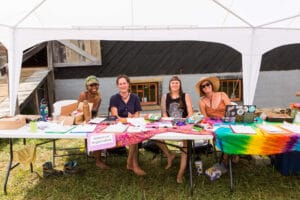February on a homestead is a time of much preparation and planning. Our minds are on seeds and soil and all that must be done to help us grow the abundance we hope to co-create with Earth for the year. This planning stage is a perfect time to explore new ways to co-create abundance with your community and to take a few steps further away from capitalist consumer culture.
Our current economic system is designed to force every person into “earning” money in order to buy (ostensibly) all we need to live life. Everyone in this system must choose a job or profession for which they will earn money, which in turn they will use to purchase goods and services for all their needs. There are countless problems with this system, too many to name in this brief post, but to sum it up – this system forces us to sell our time (often doing things that we do not feel fulfilled by doing), creates vast and unjust differences in how well we are able to meet our basic needs and leaving many without their needs met, creates incredibly unsustainable drains on Earth’s resources while simultaneously generating vast amounts of waste and pollution, all while separating us from natural systems of family, friendship, and community that we need to thrive. It’s a giant tragedy, and many are seeing that this system is breaking down and failing.
Lots of folks choose to try to leave this system by opting into living life on the land, foraging and growing food and attempting to fulfill our needs for shelter and comfort on our own. Yet what many people find is that this work is overwhelming! It’s difficult to fully unplug from the demanding capitalist economy, especially when we try to take on the behemoth alone.
Let’s not do it alone!
As you are planning this year for what you hope to forage and grow, what animals you will raise, which herbs to cultivate, how many gallons of kraut you want to put up in the fall, how much fiber you need for yarn for knitting projects, and so on, this is an ideal time for getting together with your neighbors, friends, and fellow homesteaders to vision, plan, and collaborate together. Who has an abundance of seed they want to share? Who is excited about fermentation projects and would like to percolate a gallon of kimchi for each of their friends? Who is a healing whiz with green salve? Whose hens are laying fools and has eggs to give? Who has time to share for a project that will take many hands? Who wants to organize a childcare co-op? What tools can be shared among you all? Perhaps most importantly, who needs help the most?
Since most of us were raised in a consumer culture which perpetuates itself by brainwashing us to think we are not smart, strong, or capable (so that we feel desperate to buy products that will make us better!), that our comfort is only possible through wealth and accumulation of “goods,” and that those who cannot pull themselves up by their bootstraps and make a million bucks are pathetic losers, sometimes we need to get clear in our heads before being able to take the leap into cooperative work. How do you feel about asking for help? Some of us get stuck in thinking we have to be able to do it all on our own and that we are a burden if we ask for support. Do you have a price tag in your head about how much your labor is worth so you feel hesitant to give your time as a gift? Yes, your skills and knowledge are valuable, but money is not the only way to have your value be witnessed. Try to be willing not to let old programming get in your way.
Here are a few steps to make it easy for you to start with some cooperative projects:
- Make the following lists:
- People you know who you would feel most comfortable asking for and offering help.
- Projects and needs that you could use support with (this can include a need for certain tools, materials, or goods).
- Services, skills, materials, or other goods that you have available (or could have available if you planned ahead – i.e. perhaps you will plant an extra row of cabbage for the friend who wants to make ferments) for sharing, gifting, or trading.
- Reach out to your list of friends, introduce this idea, and invite them to make similar lists (you can even share this article with them!)
- Choose a date for a get together with the folks interested in this type of collaboration. Strive to have a minimum of 3 and maximum of 6 participants so there is enough interest and energy to get going but not so many people that the process gets overwhelming or bogged down.
- At your gathering go around and have each participant share their list of support needs and offerings. Take notes matching up interests and offers. Then, spend time focusing on each project for which there is shared interest. Break into smaller groups of those who are working together as needed.
- Make sure to leave your gathering with concrete action steps about what to do next for each project and follow up dates and times for meetings, work dates, or check-ins!
Boom! Welcome to the world of sacred economics. This is how we can reclaim our lives and our culture, one project at a time. The beauty of this is that not only will we all better meet our basic needs through this kind of collaboration, but we will deepen our relationships and experience the kind of genuine connection, belonging, and success that feed our souls. Enjoy.





